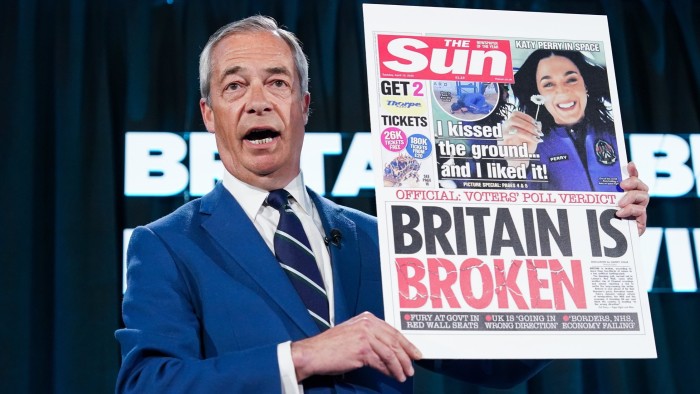Unlock the Editor’s Digest for free
Roula Khalaf, Editor of the FT, selects her favourite stories in this weekly newsletter.
Nigel Farage claimed that Reform UK is now the main opposition party as he called for the re-industrialisation of Britain in an attempt to win votes across Labour’s traditional northern heartlands.
With just over two weeks until local elections on May 1, Farage said that the party is “parking its tanks on the lawns of the red wall”, a reference to the swath of seats that traditionally voted Labour but were won by Boris Johnson’s Conservatives in 2019. Many of these seats swung back to Sir Keir Starmer in last year’s general election.
As opinion polls put Reform level-pegging with Labour, Farage said the support the party was garnering across Britain — and particularly across parts of Labour’s old heartlands — was “not a short-term protest”.
“Those voters are here and they are here to stay,” he told party members during a campaign speech in County Durham.
The Sun, a tabloid with a long history of backing electoral winners in the UK, ran a front-page story on Tuesday with the heading “Britain is Broken” — the first part of Reform’s slogan, which ends “Britain needs Reform”.
Farage smiled as he brandished a poster of the newspaper’s front page on stage and claimed support for his party extended beyond former Conservative voters to “life-long” Labour supporters.
The Sun article cited a poll by Survation across areas in the red wall, which found that more people thought Farage would make a better prime minister than Starmer.
“We are the party of working people and broken Britain deserves nothing less,” Farage said, pointing to the poll that found that 30 per cent of people in the area believed Reform was the party of working people, compared with 22 per cent who thought Labour was.
Farage was speaking from a working men’s club in one of the more deprived wards of County Durham during his multi-week campaign trail ahead of local elections.
Reform is hoping to sweep up more than 200 out of 1,600 available council seats, particularly across Durham, Doncaster, Lancashire, Kent and Lincolnshire.
The party also has its sights set on two mayoralties, in Lincolnshire and Hull, as well as the parliamentary constituency by-election in Runcorn.
Reform has seen an extraordinary rise in support since the general election, and is now polling neck and neck with Labour, on around 24 per cent of support, compared with the Tories, which have 22 per cent.
However, several pollsters and academics are skeptical of Farage’s claim that Reform is attracting large numbers of former Labour voters, and argue that the vast majority of Reform’s support is coming from former Tory voters.
Paula Surridge, a professor of political sociology at Bristol university, said the “degree of Labour to Reform swinging is very small”. She noted that the proportion of people who voted Labour in 2024 who said they liked Farage or the Reform party was in the single digits.
Farage said Britain was undergoing an “industrial massacre”, arguing that the UK should be self-sufficient in oil and gas and should be producing its own coal. “Reform will reindustrialise Britain, and we will have a proper, sound industrial policy,” he said.
In a sign of Farage’s growing divergence from his more Thatcherite past, he also said that having a “pragmatic, sensible relationship” with unions was “of course vital”.
Farage told the Financial Times that “trade unions representing the rights of working people . . . is perfect”.
The Reform leader posed with unionised workers in Scunthorpe during the British Steel crisis, and Reform deputy leader Richard Tice wore a trade union badge in the House of Commons earlier this week.
Addressing a room of mostly middle-aged white men — and harking back to Durham’s coal-mining history — Farage said that the Labour party had once “existed to give working men a voice”.
He argued that the Labour party under Starmer was a “very middle-class party, full of human rights lawyers who seem to care more about the concepts of international law . . . than it does about working people”.
The Reform leader reiterated his call for British Steel to be renationalised, arguing that the Labour government only acted to save the steel group over the weekend because he had made a visit to the steel plant earlier in the week.
“We have allowed China to get so deep inside our critical infrastructure, so deep inside our universities and elsewhere,” he said, referring to British Steel’s Chinese owner, Jingye Group. “I don’t want China in our nuclear industry, I don’t want China in our telecoms.”
In a sign the Reform leader is concerned that the rightwing vote could still be split, he repeated twice that a vote for the Tories was a “wasted vote”.
When asked by the FT to name a policy that would appeal to women voters, Farage said women were typically “more cautious” than men who were more confident in “voting for what they wanted”.




